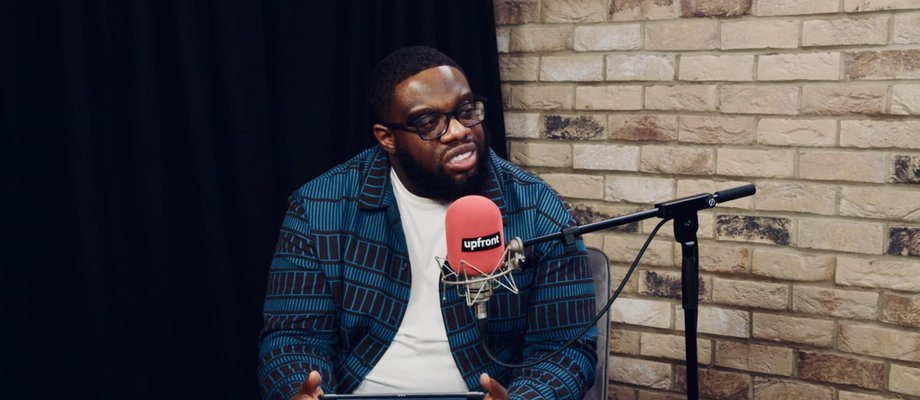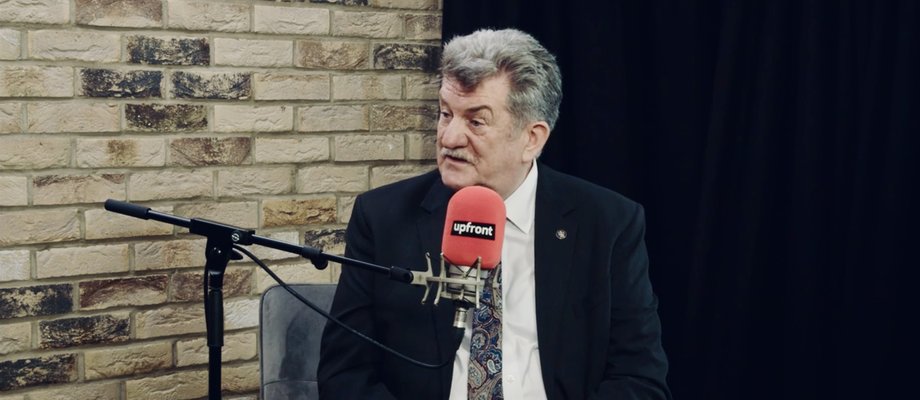How will financial services survive the next crisis or scandal? Legendary crisis communications expert Donald Steel joins Emmanuel Asuquo for the Upfront series finale.
Here are some highlights from that conversation. Listen to the episode in full here.
Emmanuel: So, Donald, tell us, how will financial services survive the next crisis or scandal?
Donald: It comes down to the business of predicting what can happen to you. All crises are predictable. There's nothing that can happen to you that you can't predict and then prepare for them. I think it's the same in every sector, including financial services, is this ability to predict and risk assess what might happen and then prepare for it, which is, after all, what they do when they're creating financial instruments, you need to do the same for your reputation.

Emmanuel: What is a crisis then? If we can predict this stuff already, what is the whole crisis management and crisis about?
Donald: This is a brilliant question because what we talk about in crisis communications is that the word crisis has only one purpose. You should only use the word crisis when you invoke the special procedures you've prepared, the team meeting in a room, the senior people, and the different command structures; otherwise, it has no business purpose. The word crisis is bandied around. It's a tabloid word. The word crisis is used to make something seem more interesting or urgent. Actually, in each different company, there is a different definition of a crisis. And in your crisis plan, you need to give examples of the categories of crisis. One of the things we do when we go around companies is give people a load of cards with different scenarios that might happen to that company. And they have to define whether they're a crisis, an issue, or everyday business and it's quite interesting the debate because they don't all agree.
We talk about the bank of trust. You have to be careful you don't make too many withdrawals.
Crisis communications expert
Emmanuel: Do you think enough businesses even have a crisis management plan?
Donald: Warren Buffet said that you haven't got a business without a reputation. Trust is at the core of all reputation, and we talk about people having a big balance in the bank of trust. Now you have to watch that you don't make too many withdrawals. You don't have too many crises because you only have so much trust. In a big crisis, you could make a big withdrawal. There's this thing we call the drumbeat of positive publicity. It may not be earth-shattering, but we've got this new service, we've won this award, you know, all of the stuff that you do, we've helped someone out, we're doing some community work here. It's all building up this drumbeat of publicity and the bank of trust. Don't dismiss it because you may need to make a withdrawal when things go wrong, which they do with the best will in the world.
Emmanuel: You come across so cool, not cold, like cool as in relaxed. Although you're in these high-pressure environments, I feel like the pressure's around you but not in you. Where does that come from?

Donald: A lot of what we do in preparing for crisis management and crisis communications is we have checklists. So when something happens, we'll grab the checklist, and we've already thought, and we'll do this and this and this. So, for example, in communications. Check what's on social media at the moment. Cancel all planned posts because they're almost certainly going to jar with what's happening. Increase the level of approval of posts because you need several pairs of eyes on so that you're not causing further offence or making the crisis worse and so on. Now, why do we have those? Because in a crisis, adrenaline starts to surge, which is not a useful hormone in a crisis, there are no prizes given by companies for hiring people who come in and make them feel more panicked than they did before. You need to go in and feel a bit of calm. I've lived a long time and I've often wondered if this is a little gift as you get older, that people like a bit of grey hair when their jobs are on the line.
It takes far too long to get statements approved in a crisis, so write them now.
Crisis communications expert
Emmanuel: Is there a cookie cutter method for any crisis?
Donald: Every company needs a crisis plan. Crisis preparation is an evolutionary process, not something you do in a week. The essential ingredient is spotting a crisis on time, which is a main cause of failure because most crises don't just suddenly happen. It's about how and when we start communicating immediately. To whom do we communicate? How do we communicate internally? How do we organize ourselves? Who becomes the face of the company? It's usually the chief executive for the most serious crisis. It takes far too long to approve statements when you're in a crisis, so write them now. All crises are predictable. If we can predict them, we can write brief statements. It's not that difficult. The public want information and they're not forgiving if they don't see it.
Emmanuel: What advice do you have for the financial sector to help them prepare for the next scandal or crisis?
Donald: Think of everything that could happen to you. You're very focused on your business activities, of course you are. But many other things can happen to you in all of the ancillary things you do around the business. Have you got a plan for every eventuality, and how will you communicate? If you're in the financial sector, don't just think about your products and services. The delivery of your services - what happens if the phone line or your internet goes down? What's our risk in our social media? What's our risk in our different comms activities in speeches? Famously, people making speeches is often a risk. Humour is a risk. We have to think of everything and then work out a plan. If you think this doesn't affect you, you're putting all your work at risk for quite a small amount of preparation. Predict what might happen to you, and prepare for it. That's my big message to everybody: predict and prepare, and then you've got a good chance of coming through it and doing it right.
Listen to this episode in full here.
Meet our guest
Donald Steel
Donald is one of the best crisis management experts in the business and a natural at handling the world's trickiest, most high-profile crises. For 11 years, Donald was the BBC's chief media spokesman, where he dealt with the communication response to the most serious incidents, including terrorist attacks, kidnappings, and murder.
When he left the BBC, he set up his own global crisis communications practice, where his clients ranged from government departments to high-profile individuals. He's also the vice president of crisis communications at Kenyon.
Loved this?
Then listen up
Upfront is the award-winning podcast for the financial services industry brought to you by Iress. Series 3 is out now, featuring 10 brand new episodes and conversations that everyone working in financial services needs to hear. Listen to Upfront on your favourite podcast app and follow so you never miss an episode.





